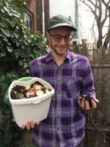httpv://www.youtube.com/watch?v=WvcqbvBkyNQ
Recently I sent a few questions over to Nelson Widell at Wilmington Organic Recycling Center. I’ve visited the facility a few times, and I had some questions about contamination and sorting, as well as bioplastics and pressure treated wood…so here we go:
Tyler: How much compost is created each day?
Nelson: We are producing about 200 tons per day of compost.
Tyler: What would you say the average contamination rate is for your incoming loads?
Nelson: Contamination is approximately 3% by weight.
Tyler: What’s your least favorite common contaminant you receive from incoming loads? (in compost receptacles available to patrons, I always see ketchup packs and plastic utensils)
Nelson: The plastic circular label stickers put on bananas and tomatoes is the least favorite contaminant.
Tyler: Describe the sorting system in place to sift out plastics/other contaminants at the end of the cycle.
Nelson: We screen the end product on rotary trommel screens with an air sifter for plastics. The air sifter is essentially a giant vacuum cleaner and sucks plastic away from compost because it is lighter.
Tyler: How do you test for pressure treated wood versus non pressure treated wood for composting?
Nelson: Testing for Arsenic levels is the way to make sure we aren’t getting pressure treated wood.
Tyler: My understanding is that bioplastics take longer to break down, exemplified by Sun Chips bags, and compostable plastics sticking around through several home compost cycles. Is this the case even in your massive hot composting setup?
Nelson: The bioplastics are OK in our system because of the higher heat we generate.
Tyler: Do bioplastics take more than one full cycle to break down? Does the temperature get up around 160 degrees?
Nelson: Temperatures are up to 160F and it’s impossible to find bioplastics after it runs through one time.
Tyler: Do you receive horse/cow/chicken manure at the facility to improve the compost, or are you technically making mulch?
Nelson: We receive animal manure, but it doesn’t necessarily improve the compost appreciably. Manures make no difference since the broad base of materials we process include plenty of nitrogen and protein already.
Tyler: How often do you get “fake” non ASTM D6400 liners that end up leaving plastic behind, such as oxo biodegradables?
Nelson: It isn’t possible to detect “fake” non ASTM liners since we are currently receiving well over 500 tons per day.
Tyler: So then at the first stop, you just rip open any non-green bags (first obvious sign) and put them aside for trash? Is your end of process plastic waste mostly skeletons of non biodegradable bags? Chip bags? Condiment packs?
Nelson: Our front end processing includes breaking the bags and mixing in the slow speed shredder but no bag removal. That’s done on the back end after composting since at that time the material is dry and more readily and cleanly separated both by screen sizing and wind sifter.
Tyler: Any plans to build more facilities? Not that Wilmington is far, but Philly could certainly use one…
Nelson: We are planning additional facilities in Chicago, Massachusetts, and Baltimore.
